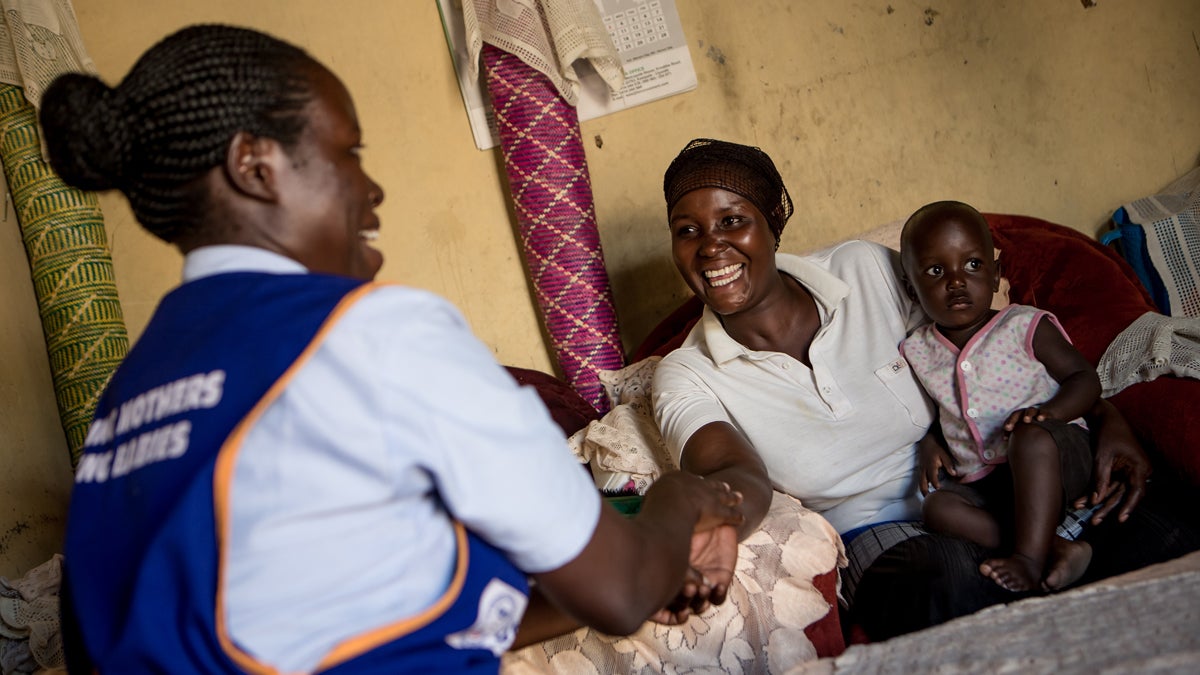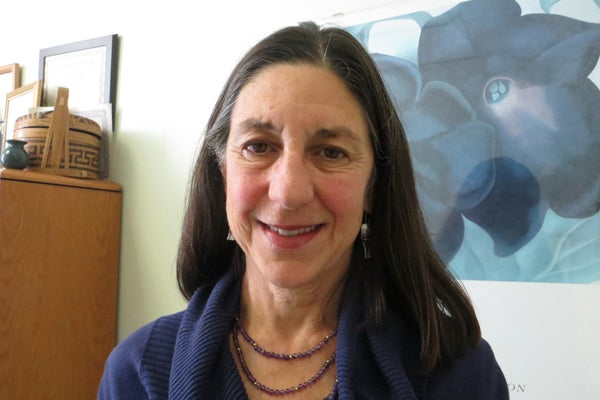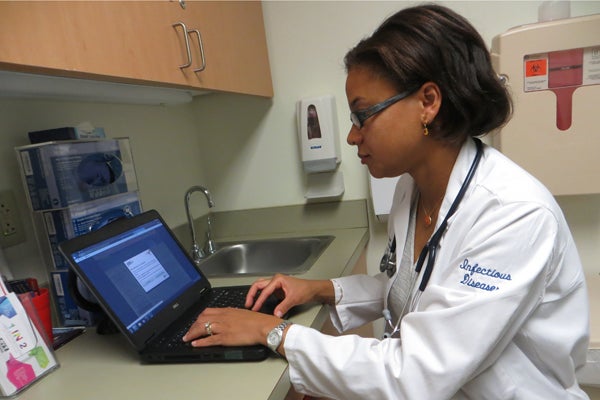After pregnancy, helping moms with HIV continue health care
Listen
The program Mothers2Mothers in Cape Town South Africa hires women with HIV as mentors to support new moms. There are now hundreds of program sites in seven African countries. (Photo by Karin Schermbrucker
Once a new mom with HIV delivers a healthy baby, sometimes she thinks she’s ‘done.’
The healthcare system has gotten very good at getting pregnant women who are HIV positive into treatment and preventing them from passing the infection on to their babies. Healthcare providers say what comes next is the problem: too many postpartum women are dropping out of care.
“She gets lots of attention; she gets lots of strokes for coming in, and that kind of starts to fall off after pregnancy,” said Erika Aaron, director of Women’s Services for the Partnership Comprehensive Care Practice at Drexel University College of Medicine.
Aaron’s a nurse practitioner and has been caring for women with HIV for 25 years.
“I’m a Philadelphia girl living her life,” one of Aaron’s patients said. She’s also eight months pregnant and has HIV.
That mom doesn’t want to use her name for this story but says now that she’s in her early 30s — she does talk about her HIV status with friends and family because she wants young people to stay safe.
“It’s real. A lot of people do not think it can happen to them,” the mom said. She first discovered she had the AIDS virus when she was 25 and expecting her third child.
With medicine, the virus in her blood is now undetectable, and because of that, she and her healthcare team at Drexel are confident that she’ll be delivering a healthy baby — her fourth child — in just a few weeks.
For a woman who’s in treatment, the chances of passing the infection on to her baby is less than one percent.
In Philadelphia, about 90 percent of women who are pregnant and have human immunodeficiency virus, get some kind of HIV care.
Three months after delivery, just 38 percent of new moms in Philadelphia with HIV are still connected to care, according to an analysis from researchers at Drexel and the Philadelphia Department of Health.
The study was a review of medical records of HIV-infected women who delivered babies in Philadelphia over several years.
Study author Florence Momplaisir, an infectious-disease physician at Drexel, says a pregnant woman will do lots of things to protect her baby. Expecting moms swear off cigarettes and alcohol. They even give up foods they love. Pregnant women with HIV are also often very good about following their doctor’s orders and sticking with their medication, Momplaisir said.
A missed opportunity
But HIV-care providers are missing an opportunity to make sure moms stay in treatment after they deliver the baby, she said.
“It’s an opportunity to say, ‘you count too, we want you to be healthy too,'” Aaron said.
“They fall out of care because they are so afraid someone is going to find out,” she said. “At this point, the women who I see, who are not doing well, or who are actually unfortunately dying from HIV, it’s because of stigma.”
Aaron says in her practice, young women, especially, can be very sensitive about making sure that no one knows their HIV status. Many of them live alone with their diagnosis, and many of them are afraid to disclose— fearing rejection from a partner or family.
There are women who’ve been ‘outed’ on Facebook, and Aaron says it’s stigma that makes HIV different from managing other chronic illnesses.

Erika Aaron, director of Women’s Services for the Partnership Comprehensive Care Practice at Drexel University College of Medicine. (Taunya English/WHYY)
Countering stigma
But it seems like a big ‘ask’ to expect doctors to treat stigma.
“The stigma that we are best able to address is how people feel about themselves,” said obstetrician-gynecologist Mitchell Besser.
He developed a program in Cape Town South Africa called Mothers2Mothers, which hires women with HIV as mentors to support new moms. There are now hundreds of program sites in seven African countries.
Besser says when the complications and stresses in someone’s life begin to get better, that’s when HIV treatment moves up as a priority.
“That’s true in both Africa and here in Philadelphia. The geography is of course very different but many of the issues that people face are very similar,” Besser said.
He says mentor mothers are role models who show patients how to live “positively” without shame.
In Cape Town, when a woman is ready to share her HIV status, a mentor can go to the family home with the patient, and Besser says that support can be transformative.
“She had everyone assembled and she said, ‘This is very hard for me to share with you, I need to tell you I’m living with HIV,’ and everybody is quiet, then one of her brothers gets up and says ‘I haven’t been able to tell you, but I’m HIV positive, as well,’ a sister gets up and says ‘Me too,’ other brother gets up and says, ‘Me too,’ they hadn’t been able to share it with each other, and now the family is pulling together around all of them living with this infection,” Besser said.
He was in Pennsylvania recently to talk about ways to duplicate parts of the Mothers2Mothers program there. Besser says changing community attitudes about HIV over time is as important as health care.

Obstetrician-gynecologist Mitchell Besser founded Mothers2Mothers. (Taunya English/WHYY)
Competing life priorities
Drexel physician Florence Momplaisir was doing her specialty training when she says she realized her medical expertise isn’t nearly enough when a woman is struggling with addiction or when a patient doesn’t have a place to live.
Momplaisir remembers one mom with HIV who came in for a check-up about two weeks after giving birth. The doctor started the usual workup to figure out the best antiretroviral medicines for the woman, but the patient said what she needed most was to be back on her anti-anxiety medication.
The medical practice where Momplaisir worked at that time only managed HIV.
“She was really upset at the fact that she had to go to one clinic for her primary care, one clinic for her mental health and one clinic for her HIV care,” Momplaisir said.
The woman stopped coming in but the doctor kept trying to reach the patient.
“At that point her sister answered the phone and told me she has passed away,” Momplaisir said. “It really sort of validated for me the fact this this is real, it’s not a theoretical phenomenon, women are really falling and dying.”
It’s not clear how the woman died. Besides having untreated HIV and mental health troubles, the patient had been in a long-time domestic violence relationship. She was also an intravenous drug user. Those are the kinds of life complications that can get in the way, and Momplaisir says the care system has to get better at helping out.

Drexel physician Florence Momplaisir. (Taunya English/WHYY)
Detective work
Before you can treat a patient, you have to find her.
Marie Spencer works for the Dorothy Mann Center at Philadelphia’s St. Christopher’s Hospital for Children. She’s an outreach worker who’s a detective, of sorts, trying to track down women who’ve dropped out of care.
“We live in the neighborhood, we are where our clients are,” Spencer said. “If I see a person, and I know they have children around my grandchild’s age, I’ll go get my grandchild, then we’ll go to that park, or kinda sorta walk past their house.”
First, Spencer gives patients what they need. She has transit tokens for the bus; she’ll bring you formula for a newborn. She offers lunch and friendly hellos.
Then Spencer begins to talk about how important it is to keep up treatment. She’s good at her job, she says, because she’s not a doctor and because she’s discreet.
Sometimes she goes undercover as an aunt or a neighbor — once she pretended to be an old classmate of someone’s mom.
“We gave each other a hug, and I said while we was hugging — I said: ‘Call me,'” Spencer said
Sara Cifuentes, leads a team of social workers and case managers at the West Philadelphia office of ActionAIDS, Inc. Her team provides non-medical support for people with HIV.
Cifuentes says even when she wants a client to see the doctor; she works to respect whatever is going on in that woman’s life.
“Our priorities for our clients are not always the same as theirs,” she said.
Eighty percent of agency clients have housing trouble.
“So getting to a medical appointment drops down the list,” Cifuentes said.
“We can’t have a moral high ground,” she said. “As an agency we meet people where they are, without passing judgment. We are neutral in that sense.”
One-stop health care
To help people stick with treatment for life, Drexel and the Dorothy Mann Center designed health care sites that provide more comprehensive care.
At Drexel, “The woman sees the obstetrician or a midwife, they’ll see the social worker that works in the HIV clinic, they’ll see myself, a nurse practitioner to take care of their HIV. They’ll see a psychologist, they’ll see a nutritionist,” Erika Aaron said.
Momplaisir and Aaron also travel across town to see adult patients at the Children’s Hospital in North Philadelphia because it’s convenient for moms to come in at the same time their kid is in for a check up.
“If we capture women where they bring their children into care maybe they will take care of themselves as well,” Aaron said.
“They definitely show up to the pediatrician’s office for their infant follow ups, so how can we capitalize on that and make sure their HIV gets addressed?” said Momplaisir, an assistant professor in Drexel’s Dornsife School of Public Health.
One Mann Center patient found out she was HIV positive about a month before her due date. She delivered a healthy son, and she’s years past that diagnosis now, but her privacy is important to her, so we’re calling her “Katrina.”
She was devastated at first. Katrina remembers hormones raging and being sleep deprived in the first weeks after her son was born. In those early days, every time she had to go to a doctor’s appointment, it was a reality check.
“This is really you, this is really happening. The red ribbons are in your face,” Katrina said. “It hurts. It was such a struggle just to come to the doctor mentally.”
It was a relief to book one day of appointments for she and her son, Katrina said.
“Almost like Super Walmart, one-stop shop,” she said.
HIV treatment is simpler today but taking medicine everyday can be a reminder that you have HIV, or a reminder about how you got it.
“They say to me ‘I know I have to take this pill, but for some reason I can’t,'” Aaron said. “Sixty percent of the women that I take care of have a history of childhood sexual abuse, which means they had a horrible sexual experience when they were quite young. They also have a lot of trouble swallowing pills because of that history. The connection most likely is because of being forced to have oral sex and just not being able to swallow pills from that experience,” Aaron said.
At Drexel, an adherence counselor helps women work through problems with their medicine.
Compared to the Philadelphia average, the comprehensive care sites at Drexel and St. Christopher are having better luck getting moms to come in for postpartum HIV care, Momplaisir said.
Citywide in Philadelphia, about 38 percent of women with HIV are still in treatment three months after giving birth. At the two one-stop HIV clinics, this year about 72 percent of postpartum patients were connected to care three months after delivery.
WHYY is your source for fact-based, in-depth journalism and information. As a nonprofit organization, we rely on financial support from readers like you. Please give today.



